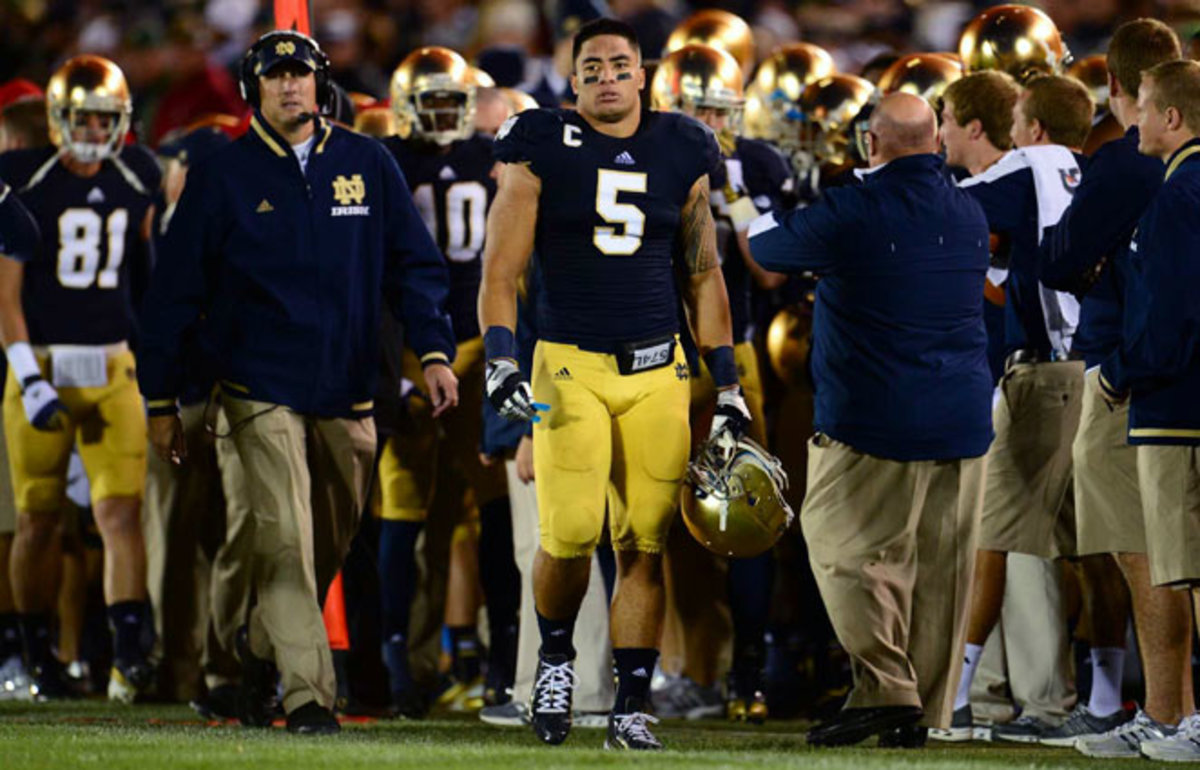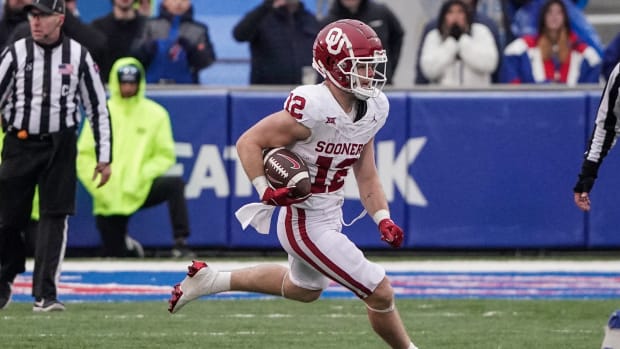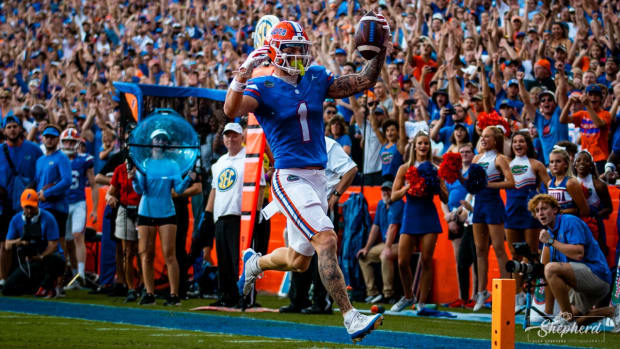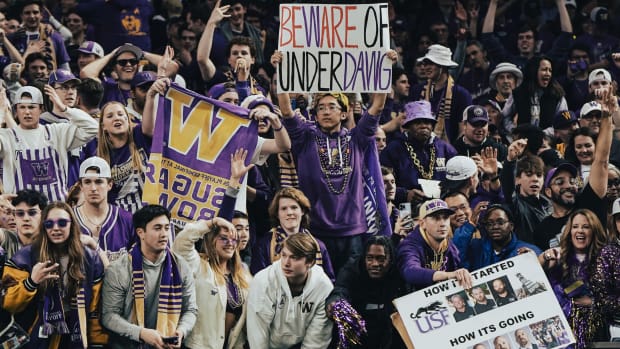For better or worse, Te'o hoax will alter sportswriting
My Friday was spent interviewing athletes and coaches for a story that will appear in an upcoming issue of Sports Illustrated. It was the customary drill in the early stages of a long process: Fly in, set up shop, do the work, fly out. There will be other trips and many phone calls in conjunction with the story. It is a piece about a thing, not a person or a place. But the story is informed by the voices of people who participated in the thing (it would be lousy business to further describe this thing, on whom others might be reporting). So in a sense, like most stories, it is about people. Things can't talk, in a literal sense. People can talk. An essential part of reporting is talking to people.
The interviews were generally good. It is not an investigative story that will bring down the walls of a corrupt institution. It might cause some people minor embarrassment and bring acclaim to others, both harmlessly. Best-case scenario: It's an informative, enjoyable read for those who choose to consume it. Oh, and if all goes right, none of the flesh and blood individuals described in the story will turn out to be fictional. And none of the tales told will turn out to be fabrications.
In one of the interviews, an athlete provided me with a terrific "anecdote.'' I was recording the interview and taking notes as well, and in this case, laughing at the story, because I knew immediately that it could find a prominent place in the piece I'm planning to eventually write. It was the kind of anecdote that captures the essence of the event, but also the personality and (and physicality) of one of the central figures in the story. There was no obvious reason to doubt the story. If the individual made it up, he did so on the spot with no specific knowledge of the questions he would be asked. The individual is not a celebrity with extensive media experience or skill at improvisation. Yet given recent events in the sports journalism culture, I found myself doubting it nonetheless.
MANDEL: Te'o hoax takes latest turn in off-camera interview
****
This column is manifestly not specifically about the media's performance before, during or after Deadspin.com's original story about the Manti Te'o catfishing or hoax. Rather, it is about the residual effects of the Te'o story, which will ripple through sports journalism for years to come in ways that will be very good and overdue, yet also potentially a little sad. (I dabbled on the periphery of the Te'o story; several weeks after the initial stories about the "death'' of his "girlfriend,'' I interviewed Te'o one-on-one in South Bend for a story on the ND program that ran later in SI. Like most others in the sports media, at this point I felt no skepticism about the Te'o fable, but I also came into the interview fully believing it to be true. That was my mindset. In response to a question about his relationship with Notre Dame coach Brian Kelly, Te'o brought up the deaths of "my grandma and my girlfriend," and cried just a little bit. It was convincing to me, but I wasn't reporting specifically on Te'o, so I moved on and those quotes didn't appear in SI. The tale had already been written endlessly and needed no further burnishing from me).
Modern sportswriting is populated by many different story forms, and that list of forms grows daily, much to the benefit of the consumer. Once there were only game stories and primitive columns. Then "features." Now there are brilliant statistical analyses that have enhanced the reader's experience exponentially (while also creating a silly divide between "old" and "new" sports journalism). There are countless blogs -- some written from the once-taboo (but absolutely no longer) fan's perspective and some not. Some of them are artful and smart, some loose, amateurish and endless. All of them are passionate. There are live blogs, oral histories, historical autopsies and bloodless takedowns. As with all media, there is more sportswriting available to the populace than at any time in history (a record that will be broken next year). More good sportswriting and more bad sportswriting.
THAMEL: What Te'o told Sports Illustrated in September interview
Those "features," which arose amid the cultural skepticism of Vietnam, Civil Rights and Woodstock and of which Gay Talese's "Silent Season of the Hero,'' a study of Joe DiMaggio published by Esquire in 1966, a decade and a half after his retirement, are a vital part of the sportswriting realm. Literally, its stories. And within that genre, stories are built upon detail upon detail upon detail. It is the detail that often brings a piece of writing to life. The Red Pontiac Firebirdwith a black spoiler, instead of just the car. And so on. Details come from observing, reporting, researching, questioning and confirming. They are critical in any great -- or even good -- narrative.
Prominent amid the animus directed at media in the wake of the Te'o story is that sportswriters are too willing accept the details provided to them in their pursuit of what mid-20th century New York City sports editor Stanley Woodard is credited with calling "Godding up," athletes and coaches, as was common in his generation (and some would assert still is). The Te'o story of overcoming tragedy to lead Notre Dame's return to mythic glory, for instance, was just too good to resist (or confirm) for everybody who passed it along, which was just about the entire media industry. The argument goes that sportswriters do this constantly, which I would dispute. But it's a bad week for disputing.
BANKS, TROTTER: Impact of hoax on Teo's draft stock
The events of this past week will lead to harsher scrutiny of those precious little -- and big -- details and therefore fewer unnecessarily fawning stories about people who play and coach games. That will be a good thing for everyone involved, as conferred by the lessons of Joe Paterno, Lance Armstrong and Te'o in just the last 14 months. Yet it might also lead to fewer narrative stories, period, and that would not be such a great thing. It's vital to take the hagiographic mythmaking out of sportswriting, but it would be unfortunate if the pure storytelling were lost with it.
Yet in all of narrative storytelling -- whether it's sportswriting or other nonfiction (insert "nonfiction" joke here), there exists a realm of the unconfirmed detail. It is that piece of information delivered which was not witnessed or recorded. It is the person who says, "I dropped to my knees and prayed for the strength to carry on." Or: "I sat alone in my apartment and drank 16 shots of Jack Daniels.'' Or: "That one afternoon I was by myself in the weight room and I did double reps on everything.'' It is the anecdote that unfolds absent scrutiny and thus absent proof. Every good writer can provide examples of such anecdotes in his work, or he can lie about having never used such details. Are all these details utter B.S.? Not likely. Are some of them? Possibly. And some of them are possibly exaggerations.
Sometimes the unconfirmed detail can be confirmed. In recent days I began looking back -- very randomly -- through some of my own work.
In a 2004 story I wrote about Villanova's NCAA basketball victory over Georgetown 19 years earlier, there is a dense paragraph about Gary McLain, Villanova's point guard in that game. The paragraph contains 15 facts about McLain, who had not been interviewed by anybody for many years. Of those 15, many were confirmable and confirmed -- that McLain "works for a company that places doctors in temporary positions," and that his daughter was 11 years old. Other facts were more slippery -- "He says he has lapsed into drug and alcohol uses "a couple of times,'' and that he is currently not using -- and almost impossible to nail down solidly. (The qualifier "He says," is a great and useful crutch in these situations, as in "The quarterback says he has a 3.79 GPA." But I can't help but wonder if the reader flies over the qualifier and accepts the information as fact.).
In a 2011 feature on Packers' quarterback Aaron Rodgers, I wrote that Rodgers "took his 1,310 SAT to Butte [college]," because Rodgers told me he scored 1,310 on the SAT. I never saw Rodgers's test results; it seems unlikely he still has them. I was confident that Rodgers was telling the truth, but the reality is that I can't know for sure. Is that detail necessary to establish that a clearly smart guy is quantifiably smart? In October of 2012, for a story on the enduring power of the 63-yard field goal, I conveyed a story in which 49ers' kicker David Akers described the low point in his professional career as lying in a Berlin hospital while playing in NFL Europe, sick with a 105-degree fever. I didn't see the chart with a 105-degree temperature. I doubt if that chart still exists. Maybe Akers' temperature was 104 degrees. Perhaps "high temperature" would have sufficed, though that is not any more provable.
In February of 2010, I wrote a cover story about skier Lindsey Vonn in which Vonn described a bike training ride with teammate Julia Mancuso from many years earlier (a story that has been repeated endlessly since). Vonn says she "fell behind them, by, like, five miles." Mancuso confirmed the ride, but the five miles? On a long ride, it's possible. But who knows for sure? That's Vonn's recollection and she was out there alone. In November of 2011 I wrote a piece about a long-ago college football player named Mike Reily who died young. (The story was included in the anthology Best American Sports Writing.) In the story, I describe a then-girlfriend of Reily's watching as he coughed up blood into a sink. Did he really cough up blood? Reily is long dead. He had Hodgkins Disease and others in the fraternity house heard him coughing, but only Reily and his girlfriend were in the room.
Electronic media are no different from print media on this matter, except that subjects are placed in front of camera and allowed to tell their stories. (The print equivalent of letting the subject own the facts by putting them inside quotation marks, which is only technically different from the writer stating the facts. "Oral Histories'' are newly popular, but any historian will explain that people's own memories of events can be deeply unreliable, and eliminating the writer/middleman doesn't change that). Athletes have become acutely attuned to the value of having "a story" to tell, to embellish their value in the media marketplace. Early in an Olympic year I was interviewing a track athlete with several other journalists who, upon being asked a single question, unleashed a non-stop epic tale of poverty, injury and triumph, all in about three minutes. She concluded with "It's an Olympic year and everybody has a story. That's mine." She didn't make the Olympic team that year, so her story remained hidden.
It's possible that the events of the last 14 months will result in media simply utilizing fewer details, although predicting the actions of an exploding media is very difficult. The rush to publish is only becoming more urgent, hence the time to confirm is ever shorter. It's easy to sanctimoniously suggest that every fact in every story in every publication and on every website should be locked down tight, but in reality that's impossible. Most details of the variety described above are relatively harmless, but Te'o's story seemed harmless, as well, until it proved untrue. Paterno's seemed virtuous. One potential outcome is that a lot of lousy, fawning stories will be saved from publication. Yet some good ones will be lost, as well.
Back to my Friday interview. This story conveyed to me about this person and this thing took place in an athletic contest, but only in the context of an interaction between two people. The "revealing" incident took place in a vacuum; it's a physical pain inflicted on one guy and his memory of that physical pain. To the other guy, it was a passing instant, which is part of what makes it good. Trust me, it's interesting. And almost certainly factual.






